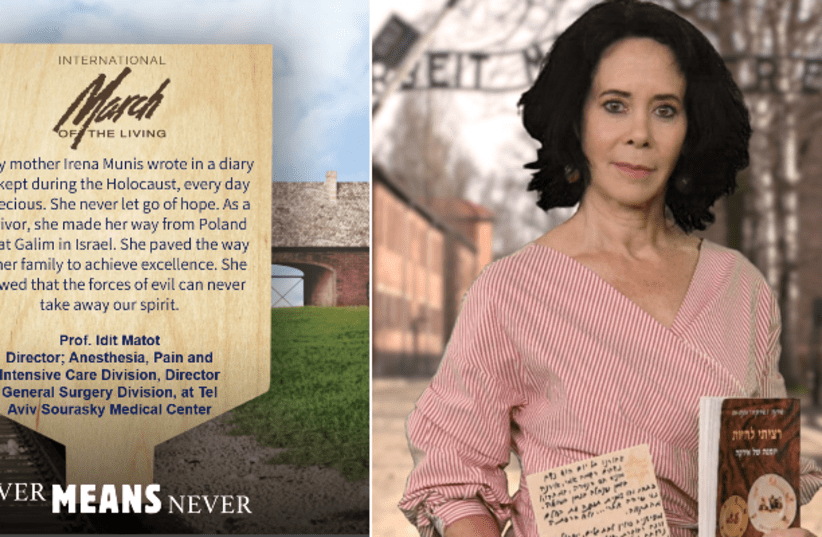My mother is not a Holocaust survivor; she is a Holocaust graduate. She was not rescued. My mother was born in a small village in Poland in 1925. Her parents, Yitzhak and Sabina Munis, were the only academics in the village. She dreamed of becoming a doctor and also started her studies. In 1941, when she was 16, the Nazis invaded. Her studies were halted, the roundup of Jews began, and the family was forced to flee. She did not believe she would survive when everyone around her was murdered.
At first, they hid in the woods at an old farmer’s house and then with a farmer named Tomzichin, who risked his life. He hid them underground in a straw-covered pit, in an area where the horses and cows roam. In 1942, inside this pit, she began writing a diary. Like any girl her age she dreamed of love, friends, trips and then came the Holocaust.
She wrote daily, for several months, about her life in hiding. We did not know there was a diary, because mom did not talk about it. For her it was a different life. This is a time where she was hardly herself. She has never talked about this life.
After we discovered her diary, I would start reading it and crying, put it aside, and once again start reading and crying. Every time I thought about myself as a 16-year-old girl, studying at the Reali, a swimmer, a scout, delegations… how does one go through that? In my head I keep going through it with her and it's not clear at all how she went through it. Her descriptions show her desire to live, but not in the sense of letting air in and out, but literally the word ‘live’ itself.
After the Holocaust, my mother studied medicine at Lodz. When she wanted to immigrate to Israel, she told the authorities that she had studied literature, because if they had known she was a doctor, they would not let her go. She was asked how it was that she studied literature for four to five years, so she said she failed a lot. In 1950 she immigrated to Israel and studied medicine in Jerusalem. She received her doctorate from Ben-Gurion himself.
My mother was one of the founders of the anesthesia profession in the country. She was the first woman to head the Anesthesiologists Association. I'm the second woman, but there are 30 years that separate between us, during which time no woman held this role. I did not intend to be an anesthesiologist, but there are things that leave a mark on you that you cannot forget. I was not just meant to be an anesthesiologist, which is a profession that is very acute, that saves lives, where there is no time to play. In the end, I think it is a vocation and it comes from her.
I saw my mother as a heroine. She was a real heroine. Her daring, her energy, her whole life she was a complete heroine and that's something that stood out in front of my eyes a lot. "A lot of active things were done there during the Holocaust," is what she always said. She had to hide all the time, but you fight to live, you do not fight to be saved. She said: "if I had known I was just a survivor and would live my life without meaning – I would not have survived". That's how it was for her.
International March of the Living will hold a Virtual March on Holocaust Remembrance. The Virtual March will premiere Thursday April 8th on Israel media at 3:00PM IL, followed by the global broadcast at 10:00 AM ET / 4:00 PM CT / 5:00pm IL and will be followed immediately by an online memorial ceremony with the first torch of remembrance lit by President Rivlin.
One of the most moving aspects of the March of the Living is the opportunity for participants to memorial plaques with personal messages on the train tracks at Birkenau. The public is invited to participate and have their personal message virtually placed against the backdrop of the infamous train tracks at the Auschwitz-Birkenau camp. Individual plaques and messages can be placed via a dedicated minisite https://nevermeansnever.com
